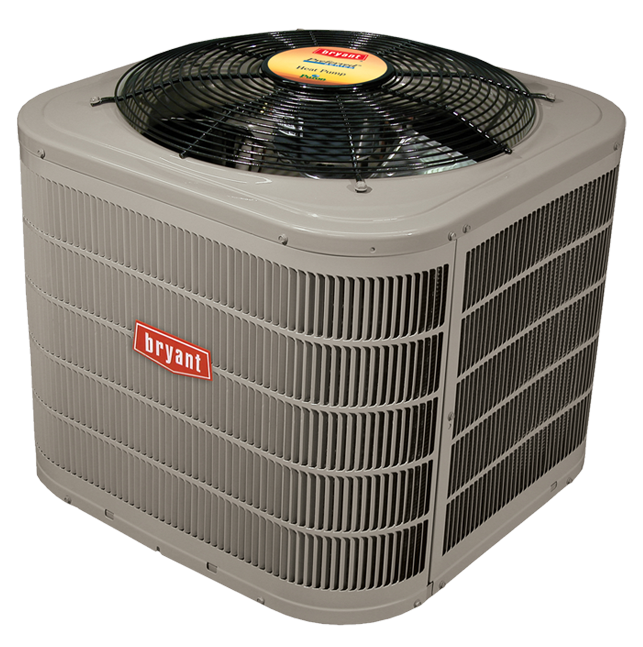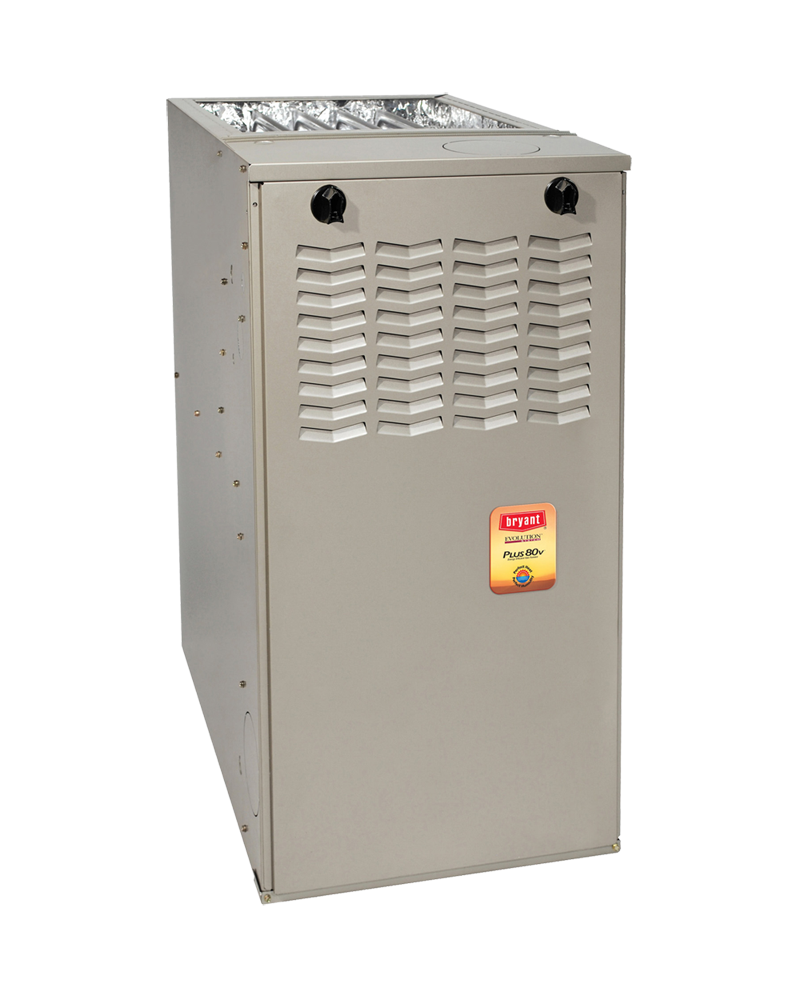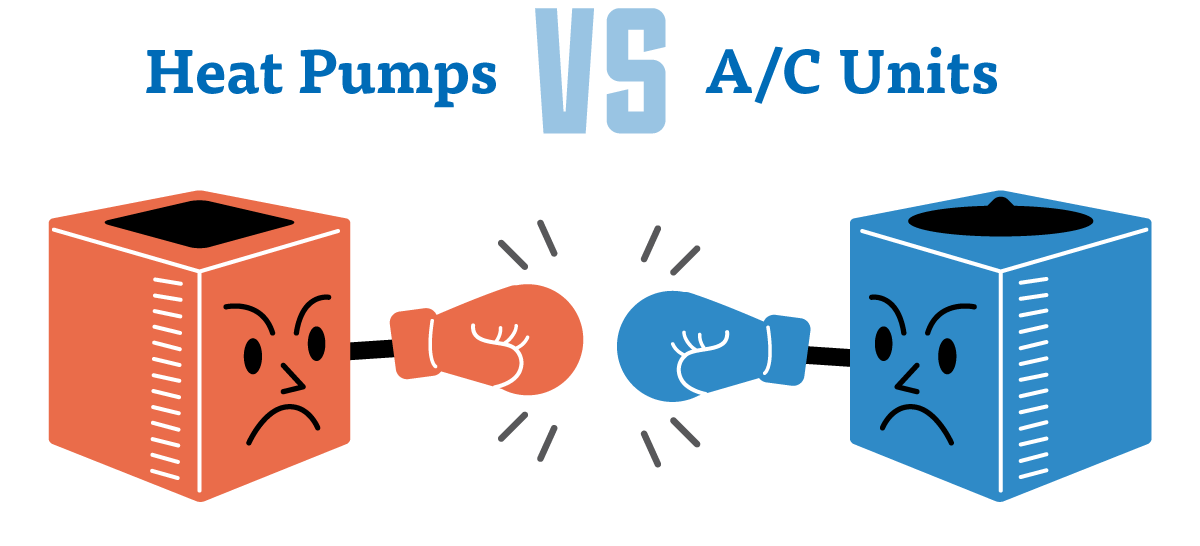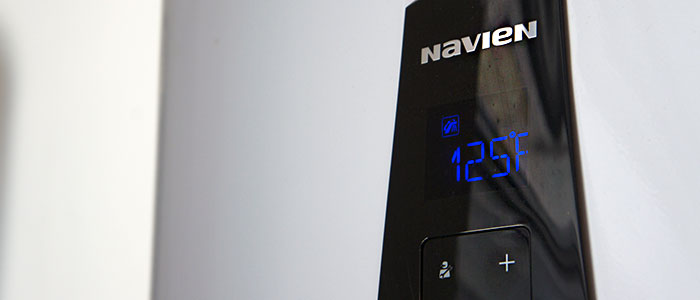
Heat pumps vs. furnaces
Furnaces are the traditional means of heating buildings. These devices use fuel to generate heat and then use a fan to circulate this heat through the building. There are gas furnaces, oil furnaces and electric furnaces.
Heat pumps act as sort of a reverse air conditioner. Instead of transferring heat from inside the building to its exterior, these machines absorb heat from the air or ground outside and transfer it inside the building. Even in cold outside air, heat energy is present. This heat outside is absorbed into a refrigerant that is evaporated at a low pressure and piped inside the facility. Once inside, the refrigerant is compressed back into a liquid. This process releases the heat that is then distributed throughout the building.
Pros & Cons of A Furnace
Perhaps the chief advantage of furnace is the start-up cost. These devices are fairly simple machines that use a very well-established technology. As such, they are inexpensive to install. Also, the effectiveness of a furnace is not impacted by the weather. As long as the machine has fuel, it will have no problem in producing heat. These machines do have some drawbacks, however. Depending on local power rates and your source of fuel, they can be expensive to operate. Furnaces also produce carbon emissions that can be harmful to the environment. These machines also typically have more maintenance needs than heat pumps.
Pros & Cons of A Heat Pump
Heat pumps’ greatest advantages are their energy efficiency and reduced environmental impact. Heat pumps are incredibly energy efficient, requiring less energy to use than traditional furnaces. This results in less carbon emissions and lower power bills. They also do not dry out the air the way furnaces do, so property owners won’t have to purchase humidifiers to add moisture back into the air.
Heat pump devices are more expensive to install than traditional furnaces, but credits or rebates from utilities may be available to help defray the cost of installation. Heat pump devices also do not work as well at very low temperatures, as there is less heat in the air for them to absorb energy from. Washington’s climate is mild, meaning that in all but the coldest of conditions, heat pumps should work fine. In parts of the country where heat pumps don’t work as well, they are often supplemented by an electric furnace. Heat pumps that draw heat from geothermal energy in the ground are also a solution to this problem.
Whether to purchase a furnace or a heat pump is largely a question of how much property owners want to spend up front and the climate of their area. How environmentally friendly property owners want their homes and businesses to be also plays into the decision.
About Washington Energy
Washington Energy Services is a family-owned business providing home energy efficiency solutions to Seattle area clients. Founded in 1957, Washington Energy Services has generations of experience in providing heating and cooling and other energy-related services, including sales, installation and service. A member of the Puget Sound Energy Contractor Alliance Network, Washington Energy Services has an excellent local business reputation.
Related products
Suggested Reading
- 2016
- AC
- AC Installation
- AC Units
- AFUE
- air conditioing
- air conditioner
- air conditioning
- air conditioning maintenance
- air conditioning service
- air conditioning tune-up
- air duct
- air duct cleaning
- air handlers
- air pollution
- Air Purification System
- air purifier
- Air Sealing
- angie's list
- award
- basement Finishing
- Bathroom remodel
- BBB
- BBB Accredited Business
- before and after
- Best air conditioner
- best filters
- best generator
- best locks
- best water heater
- best window install
- boilers
- bryant
- Bryant AC
- bryant furnace
- bryant heat pump
- christmas lights
- clean air
- clothes drive
- Clothes For Kids
- coat drive
- combi-boiler
- comfort
- community
- Construction
- contractor
- contractors
- Cooling
- Cooling equipment
- Coronavirus Protection
- custom
- daikin
- deals
- discounts
- DIY
- Donation
- Donations
- door hardware
- door installation
- door replacement
- Door Transformations
- doors
- drafty home
- drain cleaning
- Duct Cleaning
- Duct Cleaning Services
- ductless
- Ductless heat pump
- ductless heat pump. mini-split
- Ductless heat pumps
- ductless heating system
- ductless heating systems
- ductless installation
- Ducts
- durable
- earth day
- eco friendly
- EER
- election
- electrical inspection
- emergency
- energy
- energy conservation
- energy efficiency
- energy efficiency rebates
- energy efficient AC
- energy efficient air conditioner
- energy efficient home
- energy efficient hvac
- energy efficient HVAC Systems
- energy efficient windows
- energy myths
- energy saving
- energy saving home products
- energy star
- energy tax credit
- environmentally friendly
- exterior doors
- exterior siding
- fall
- fall weather
- fiber cement
- fiber cement siding
- fiberglass doors
- filter
- filter change
- financing options
- fireplace
- fireplace insert
- fireplace repair
- fireplace tune-up
- front door
- furnace
- furnace filters
- furnace install
- furnace maintenance
- furnace mileage
- furnace problems
- furnace replacement
- furnace service
- furnaces
- Garage door replacement
- gas fireplace
- gas fireplace inserts
- Gas Fireplace Makeover
- gas furnace
- generators
- going green
- good business practices
- green solutions
- Guardian Maintenance Club
- gutters
- heat
- heat pump
- heat pump installation
- heat pump maintenance
- heat pump vs ac
- Heat Pumps
- heat pumps maintenance
- heat wave
- Heating
- Heating and Cooling equipment
- heating and cooling systems
- Heating Brands
- Heating Control
- Heating equipment
- Heating System Tuneup
- heatwave
- HEPA filter
- history
- holiday
- home
- home buyer
- home energy
- home energy efficiency
- Home energy efficiency solutions
- home exterior
- home heating
- home improvement
- Home Improvement Rebates
- home improvement repair
- home inspection
- home maintenance
- home maintenance checklist
- home maintence
- home performance
- home protection
- home repair
- home safety
- home upgrade trends
- home upgrades
- home value
- homeowners
- honeywell
- hot water
- hot water heater
- houzz
- how to
- HVAC
- HVAC Contractor
- HVAC Contractors
- hvac system
- IAQ
- indoor air quality
- infographic
- install
- install furnace
- insulated composite siding
- insulation
- intellihot
- interior doors
- james hardie
- kids
- Kitchen face lift
- LED light
- LED lights
- light bulb
- light bulbs
- locks
- mailbag
- maintenance
- march
- membership
- mini-split
- modulating furnace
- money saving
- money savings
- navien
- new door installation
- new home
- New homeowner
- new siding installation
- new windows
- news
- pacific northwest weather
- patio doors
- pets
- plank siding
- plumbing
- plumbing inspection
- pnw
- power
- power outages
- precision tune up
- preventative
- Pro Tips
- Programmable Thermostat
- Programmable Thermostats
- propane
- PSE Award
- PSE Energy
- PUD
- Q & A
- rain
- Ratings
- rebates
- refund
- REME Halo
- Remodel
- remodeling hacks
- Replacing Heating System
- reputation
- Safe Home Insulation
- sale
- save energy
- Saving money
- scam
- scams
- seamless
- seamless gutters
- seattle
- Seattle Weather
- SEER
- service
- services
- shingle siding
- Siding
- Siding replacement
- sliding glass doors
- Smart Home
- Smart thermostat
- smoke
- snow
- Solar Attic Fan
- solar power
- Solar Powered Light Strand
- sound
- spring
- standby generators
- storm doors
- summer
- summer fires
- Summer heat
- Summer home
- super service 2016
- tank water heater
- Tank water heaters
- tankless tune ups
- tankless water heater
- tankless water heaters
- tax rebate
- thanksgiving
- Thermostat
- tips
- trends
- tune-up
- upgrade
- upgrade cooling
- upgrade heating
- utilities
- utility rebates
- veterans
- Washington Energy
- washington energy services
- water conservation
- Water Heater
- water heater installation
- water heater maintenance
- water heater repair
- water heaters
- water leak protection
- Wildfire Season
- wildfire smoke
- window
- window energy efficiency
- window install
- window maintence
- window remodel
- window repair
- window replacement
- windows
- winner
- winter
- zone heating
- Air Conditioning
- Air Purifiers
- Cooling
- Doors
- Ductless heat pump
- Environmental
- Fireplace
- Furnace
- Gas fireplace
- Generators
- Heat pump
- Heating
- Home improvement
- How to
- HVAC
- Indoor Air Quality
- Insulation
- News
- Plumbing
- Rebates
- Seattle
- Siding
- Smart Home
- Tank water heaters
- Tankless water heaters
- Tips to save money
- Uncategorized
- Wildfire Season
- Windows



